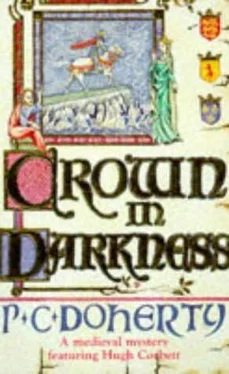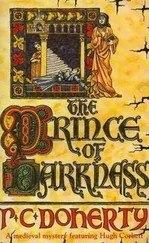Paul Doherty - Crown in Darkness
Здесь есть возможность читать онлайн «Paul Doherty - Crown in Darkness» весь текст электронной книги совершенно бесплатно (целиком полную версию без сокращений). В некоторых случаях можно слушать аудио, скачать через торрент в формате fb2 и присутствует краткое содержание. Жанр: Исторический детектив, на английском языке. Описание произведения, (предисловие) а так же отзывы посетителей доступны на портале библиотеки ЛибКат.
- Название:Crown in Darkness
- Автор:
- Жанр:
- Год:неизвестен
- ISBN:нет данных
- Рейтинг книги:4 / 5. Голосов: 1
-
Избранное:Добавить в избранное
- Отзывы:
-
Ваша оценка:
- 80
- 1
- 2
- 3
- 4
- 5
Crown in Darkness: краткое содержание, описание и аннотация
Предлагаем к чтению аннотацию, описание, краткое содержание или предисловие (зависит от того, что написал сам автор книги «Crown in Darkness»). Если вы не нашли необходимую информацию о книге — напишите в комментариях, мы постараемся отыскать её.
Crown in Darkness — читать онлайн бесплатно полную книгу (весь текст) целиком
Ниже представлен текст книги, разбитый по страницам. Система сохранения места последней прочитанной страницы, позволяет с удобством читать онлайн бесплатно книгу «Crown in Darkness», без необходимости каждый раз заново искать на чём Вы остановились. Поставьте закладку, и сможете в любой момент перейти на страницу, на которой закончили чтение.
Интервал:
Закладка:
EIGHT
For the second time that day, Gorbett was shaken awake, an insistent voice calling his name. He opened his eyes and started as he recognised the white anxious face, staring green eyes and tousled hair of his servant, Ranulf, whom he had last seen in the infirmary of Tynemouth Priory. Gorbett shook himself awake. 'Ranulf! When did you arrive?' 'About an hour ago,' Ranulf replied, 'with my horse and a pack mule. I remembered your instruction to join you at the Abbey of Holy Rood. I have spent most of the day just finding my way here from the castle.' He looked Corbett up and down. 'Where have you been? You're covered in mud!' 'A long story,' Corbett testily replied. 'I will tell you later. For the time being, find the Prior and tell him that I am back and arrange for some hot water to be brought here.' Ranulf swiftly departed. His master, he thought, was as strange as ever, close, careful, even secretive and still intent on cleanliness. He wondered what had brought Corbett north; he had tried to find out all the way to Tynemouth but Corbett remained taciturn, so Ranulf became sullen. He owed his life to Corbett who had saved him from a choking death at Tyburn, yet Corbett was still mysterious; working constantly, his only pleasure being the flute, some manuscript or sitting quietly over a cup of wine brooding about life. Ranulf had cursed his departure from London away from the young wife of a London mercer. He felt a tightness in his groin and muttered foul oaths: she was a fine lady with her laces and bows and arrogant looks but, between the sheets, a different matter, soft and pleading, turning and twisting beneath him. Ranulf sighed heavily, a long way from this dour monastery and his secretive master.
Corbett was, in fact, very pleased to see Ranulf again. He would not admit it but he felt secure with Ranulf who would guard his back. Corbett was completely mystified by his servant's energy and zest for life and passionate attachment to any woman who arched an eyebrow at him. But Ranulf was here and while Corbett bathed and changed his clothing, he wondered how Ranulf could protect him from the secret assassins now stalking him. The attack in the forest was attempted murder and he now drew the same conclusion about the dagger thrown at him the previous day.
Corbett spent the rest of the evening analysing what he knew and had learnt but soon realised that he had been drawn into a maze of marshy morass and the more he probed, the more puzzled he became. He did not talk to Ranulf about the problem but listened with half an ear to the young man's description of his stay at Tynemouth as he wondered what to do next. Corbett felt inclined to draw up a report for Burnell. This would at least enumerate the problems he now faced, and acquaint the Chancellor about his complete lack of progress. He finally decided against this. So far he had only spoken to minor figures of the tragedy which befell Alexander III at Kinghorn. Benstede and de Craon could give little information. Perhaps the great ones of the land knew something different and should be approached. Moreover, Corbett realised that if de Craon knew he was asking questions it was only a matter of time before the Council of Guardians intervened and either put a stop to his activities or expelled him from the country. He therefore had to work quickly and collect some information to take back to Burnell in London.
After Compline, the last service of the day, Corbett approached the Prior and asked him where he could meet Robert Bruce. The Prior, no man's fool, stared hard at Corbett and shook his head in warning. 'Be very careful, Master Clerk. I suspect what you are involved in. I have heard vague rumours, comments, court gossip. These are troubled times and you have decided to fish in very dangerous and deep waters.' Corbett shrugged. 'I have no choice,' he replied. 'Each of us has his tasks, I have mine. I do not know what you have heard and I will not ask. I do no man any harm and perhaps may achieve a great good. That is why I wish to see the Lord Bruce.' The Prior sighed. 'Normally the Bruces are in their mountain castle across the country on the River Clyde but, because of the late King's death, Bruce stays near Edinburgh. After all,' the Prior continued sardonically, 'he has no desire to see the cake taken while his back is turned. Rumour has it that he has taken up residence in the port of Leith, near enough to Edinburgh but, should matters go wrong, the best place for his departure by land or sea. Nevertheless, I will check to see if this is correct and inform you tomorrow.'
The next morning when the bells of the abbey tolled for Prime, the first prayer of the monastic day, Corbett was up, dressed and gently kicked a sleepy, grunting Ranulf awake. They joined the long silent line of monks filing into the church. Corbett sang the psalms with them, feeling a great deal of the tension within him dissipate with the monotonous, harmonious chant. Ranulf sat slumped in the bench beside him, groaning and muttering at his master. after the service was over, they broke their fast in the small whitewashed refectory before approaching the Prior who confirmed his speculation of the previous evening that the Lord Bruce and his entourage had taken up residence in the port of Leith. Corbett and Ranulf immediately took their leave and were through the abbey gates travelling north to Leith just as the sun rose. They made fair progress. Corbett felt refreshed though still wary, pleased that the previous day's rainclouds had now disappeared and hoping that the Lord Bruce was still in Leith and would grant him an audience. They skirted the city, threading their way through the still-silent streets and, following the Prior's careful directions, soon found themselves on the broad beaten approach to the port of Leith. This was busy with carts and pack-horses making their way into Edinburgh, bringing in the products from both port and countryside to be sold at the markets. Wagon-loads of fish, fruit, salted meat, English wool and Flemish velvets, each wagon jostling for a place on the rutted track. The drivers, flushed and cursing, each trying to be the first into the city and to have their wares ready for sale before the city came to life.
Corbett rode quietly between them, keeping a wary eye on Ranulf who, after staring round-eyed at everything, began to mimic the strange accents, and drew dark looks from a number of passers-by. Corbett urged him to keep quiet and was more than relieved when they entered the narrow, winding, rutted streets of Leith and made their way to the small market square. Here Corbett began to question any respectable citizen on the whereabouts of the Lord Bruce's household and described to Ranulf the insignia of Bruce's retinue in the hope that his sharp-eyed servant might discover.someone wearing this livery. Neither seemed able to elicit any information. Many of the townsfolk could not understand them and Ranulf, particularly, found it difficult to cope with the broad flow of Scottish his questions provoked. They drew a small crowd of bystanders who, finding they were English, began to mutter and curse. Corbett realised that this was Leith, a Scottish port, whose ships were often in conflict with English vessels. He had forgotten this unofficial war and damned his own foolhardiness at not taking the matter into account.
At last they decided to withdraw from the square and were on the point of departure when they were suddenly surrounded by a group of tough-looking soldiers, helmeted and armed. Their leader grabbed the bridle of Corbett's horse and asked him a question he could not understand. The man repeated it, this time in atrocious French. Corbett nodded. Yes, he announced, he was an English clerk. He bore greetings from the Chancellor of England to the Lord Bruce and sought an audience with him. The man's wolfish face broke into a grin, displaying a set of decay-blackened teeth. 'Oh well,' he replied in French. 'If an English clerk wants to see the Lord Bruce, then that can be arranged.' He slipped a hand beneath Corbett's cloak and deftly drew out the clerk's knife which he stuck into his own sturdy leather-studded belt, and almost dragged the horse across the market-place. The rest of his party brought up the rear, baiting and goading Ranulf, who gave as good as he got with a stream of obscene English oaths. They left the marketplace for a maze of streets and eventually came to a large stone two-storeyed house with a timbered roof, its exquisite carved eaves jutting out over a small courtyard beneath. Both Corbett and Ranulf were dragged unceremoniously off their horses and pushed through the main door of the house and down a passageway which led into the main room or hall.
Читать дальшеИнтервал:
Закладка:
Похожие книги на «Crown in Darkness»
Представляем Вашему вниманию похожие книги на «Crown in Darkness» списком для выбора. Мы отобрали схожую по названию и смыслу литературу в надежде предоставить читателям больше вариантов отыскать новые, интересные, ещё непрочитанные произведения.
Обсуждение, отзывы о книге «Crown in Darkness» и просто собственные мнения читателей. Оставьте ваши комментарии, напишите, что Вы думаете о произведении, его смысле или главных героях. Укажите что конкретно понравилось, а что нет, и почему Вы так считаете.












